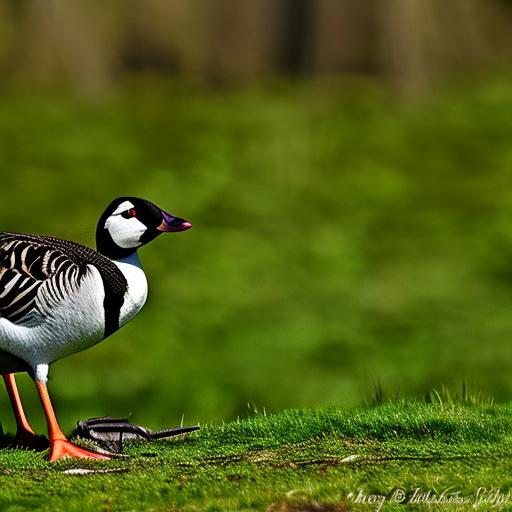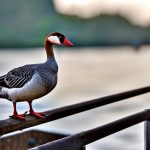Canadian geese are a common sight in many parts of North America, including Canada and the United States. These large waterfowl are known for their distinctive honking calls and V-shaped flight formations. While they may be a beautiful sight in the wild, having geese on your lawn can be a nuisance. They can cause damage to your property and pose health risks due to their droppings. In this article, we will explore the behavior of Canadian geese, the importance of keeping them off your lawn, and various methods for deterring them.
Key Takeaways
- Canadian geese are social birds that mate for life and are highly protective of their young.
- Geese can cause damage to lawns, gardens, and waterways, and their droppings can pose health risks.
- Natural deterrents like tall grass, noise makers, and predator decoys can help keep geese away.
- Physical barriers like fences, netting, and hedges can also be effective in preventing geese from accessing your property.
- Using decoys that resemble predators or other geese can scare off geese and prevent them from returning.
Understanding the behavior of Canadian geese
Canadian geese are migratory birds that travel long distances between their breeding grounds in the north and their wintering grounds in the south. They have a strong instinct to return to the same breeding and wintering sites year after year. This is why you may see flocks of geese flying overhead during certain times of the year.
Geese are attracted to certain areas, such as lawns, because they provide ample food sources and open spaces for nesting. Lawns offer a variety of grasses and plants that geese can graze on, as well as easy access to water sources like ponds or lakes. Additionally, lawns provide a clear line of sight, allowing geese to spot potential predators from a distance.
The importance of keeping geese off your lawn
Having geese on your lawn can cause significant damage. Geese are voracious grazers and can quickly strip a lawn of its vegetation. They also leave behind large amounts of droppings, which can be unsightly and pose health risks. Geese droppings can contain harmful bacteria such as E. coli and Salmonella, which can contaminate water sources and cause illness in humans and pets.
Furthermore, the constant presence of geese on your lawn can lead to soil compaction, which can hinder the growth of grass and other plants. This can result in bare patches and an overall decline in the health and appearance of your lawn.
Natural ways to deter Canadian geese
There are several natural methods for deterring Canadian geese from your lawn. One effective method is to plant certain types of vegetation that geese do not like. Geese prefer short, tender grasses, so planting taller grasses or native plants can make your lawn less attractive to them. Additionally, geese are deterred by plants with strong scents, such as lavender or rosemary.
Another natural deterrent is to create a barrier of tall shrubs or trees around your lawn. This can make it more difficult for geese to access your property and can also provide nesting sites for other birds that may prey on geese eggs.
Installing physical barriers to keep geese away
If natural methods are not effective, you may consider installing physical barriers to keep geese off your lawn. Fences or netting can be used to create a physical barrier that prevents geese from accessing your property. However, it is important to note that these barriers need to be at least three feet high to be effective, as geese are capable of flying over lower obstacles.
While physical barriers can be effective in keeping geese away, they may not be aesthetically pleasing and can require regular maintenance. Additionally, they may not be suitable for all properties, especially those with large open spaces or bodies of water that geese can still access.
Using decoys to scare off Canadian geese

Another method for deterring Canadian geese is the use of decoys. Decoys are objects that resemble predators or other animals that geese perceive as a threat. Placing decoys such as fake owls or coyotes on your lawn can scare off geese and prevent them from landing.
Decoys work by triggering the geese’s natural instinct to avoid potential predators. However, it is important to regularly move the decoys around to prevent geese from becoming accustomed to their presence. Additionally, decoys may not be effective in all situations, especially if geese have already established a nesting site on your property.
The benefits of planting certain types of vegetation
Planting certain types of vegetation that geese do not like can have several benefits. Firstly, it can make your lawn less attractive to geese, reducing the likelihood of them landing and causing damage. Secondly, these plants can provide habitat and food sources for other wildlife, such as butterflies or birds. Lastly, planting native plants can contribute to the overall biodiversity and health of your local ecosystem.
Some examples of plants that geese tend to avoid include tall grasses like switchgrass or big bluestem, as well as plants with strong scents like lavender or rosemary. These plants not only deter geese but also add beauty and interest to your landscape.
Creating a designated feeding area for geese
Creating a designated feeding area for geese can help keep them off your lawn. This involves providing an alternative food source in a location away from your property. By doing so, you can redirect the geese’s attention and reduce their reliance on your lawn for food.
A designated feeding area can be as simple as a small patch of grass or a gravel area where you scatter birdseed or cracked corn. It is important to regularly maintain this area and ensure that it is far enough away from your lawn to prevent geese from wandering back onto your property.
Making your lawn less attractive to geese
There are several ways to make your lawn less attractive to geese. Firstly, you can remove standing water sources such as birdbaths or puddles, as these provide drinking water for geese. Secondly, keeping your grass short can make it less appealing to geese, as they prefer longer grasses for grazing. Regular mowing and trimming can help deter geese from landing on your lawn.
Additionally, you can use visual deterrents such as reflective tape or scare balloons to make your lawn appear less inviting to geese. These visual deterrents create movement and noise, which can startle geese and discourage them from landing.
Seeking professional help for geese control
In some cases, it may be necessary to seek professional help for geese control. Professional geese control services have specialized knowledge and experience in managing geese populations. They can assess your property, develop a customized management plan, and implement effective deterrent methods.
Some examples of professional geese control services include habitat modification, egg addling (a process of preventing eggs from hatching), and the use of trained dogs to chase away geese. These methods are typically more effective than DIY approaches and can provide long-term solutions for keeping geese off your lawn.
The ethical considerations of geese management
When managing geese populations, it is important to consider the ethical treatment of these animals. Geese are protected under various wildlife conservation laws, and it is illegal to harm or kill them without proper permits. Therefore, it is essential to use humane methods for deterring geese and to prioritize their welfare.
Humane methods include using non-lethal deterrents such as decoys or physical barriers, as well as creating alternative habitats or feeding areas for geese. It is also important to avoid disturbing nesting sites or interfering with the natural behavior of geese.
In conclusion, keeping Canadian geese off your lawn is important to prevent damage to your property and reduce health risks associated with their droppings. Understanding the behavior of Canadian geese can help you implement effective deterrent methods. Natural methods such as planting certain types of vegetation or creating physical barriers can be effective in keeping geese away. Additionally, creating a designated feeding area and making your lawn less attractive to geese can help deter them from landing. If DIY methods are not effective, seeking professional help for geese control can provide long-term solutions. It is important to manage geese populations in an ethical manner, prioritizing their welfare while protecting your property.
If you’re looking for effective ways to keep Canadian geese off your lawn, you might also be interested in learning about the benefits of having a chicken coop in your backyard. Not only can a chicken coop provide fresh eggs and a sustainable food source, but it can also help deter unwanted pests like geese. Check out this informative article on poultrywizard.com to discover how a chicken coop in Chester, SC, can be an excellent solution for keeping your lawn goose-free.
FAQs
What are Canadian geese?
Canadian geese are a species of waterfowl that are native to North America. They are known for their distinctive black heads and necks, white cheeks, and brown bodies.
Why do Canadian geese come onto lawns?
Canadian geese are attracted to lawns because they provide a source of food and water. They will often graze on grass and other vegetation, and may also drink from ponds or other bodies of water on the property.
What problems can Canadian geese cause on lawns?
Canadian geese can cause a number of problems on lawns, including damaging grass and other vegetation, leaving droppings that can be unsightly and unsanitary, and potentially spreading diseases.
How can you keep Canadian geese off your lawn?
There are a number of strategies that can be used to keep Canadian geese off your lawn, including installing physical barriers like fences or netting, using repellents like noise makers or visual deterrents, and modifying the landscape to make it less attractive to geese.
Are there any legal restrictions on how to keep Canadian geese off your lawn?
There may be legal restrictions on how to keep Canadian geese off your lawn, depending on where you live. It is important to check with local authorities to ensure that any methods used are legal and humane.
Meet Walter, the feathered-friend fanatic of Florida! Nestled in the sunshine state, Walter struts through life with his feathered companions, clucking his way to happiness. With a coop that’s fancier than a five-star hotel, he’s the Don Juan of the chicken world. When he’s not teaching his hens to do the cha-cha, you’ll find him in a heated debate with his prized rooster, Sir Clucks-a-Lot. Walter’s poultry passion is no yolk; he’s the sunny-side-up guy you never knew you needed in your flock of friends!







